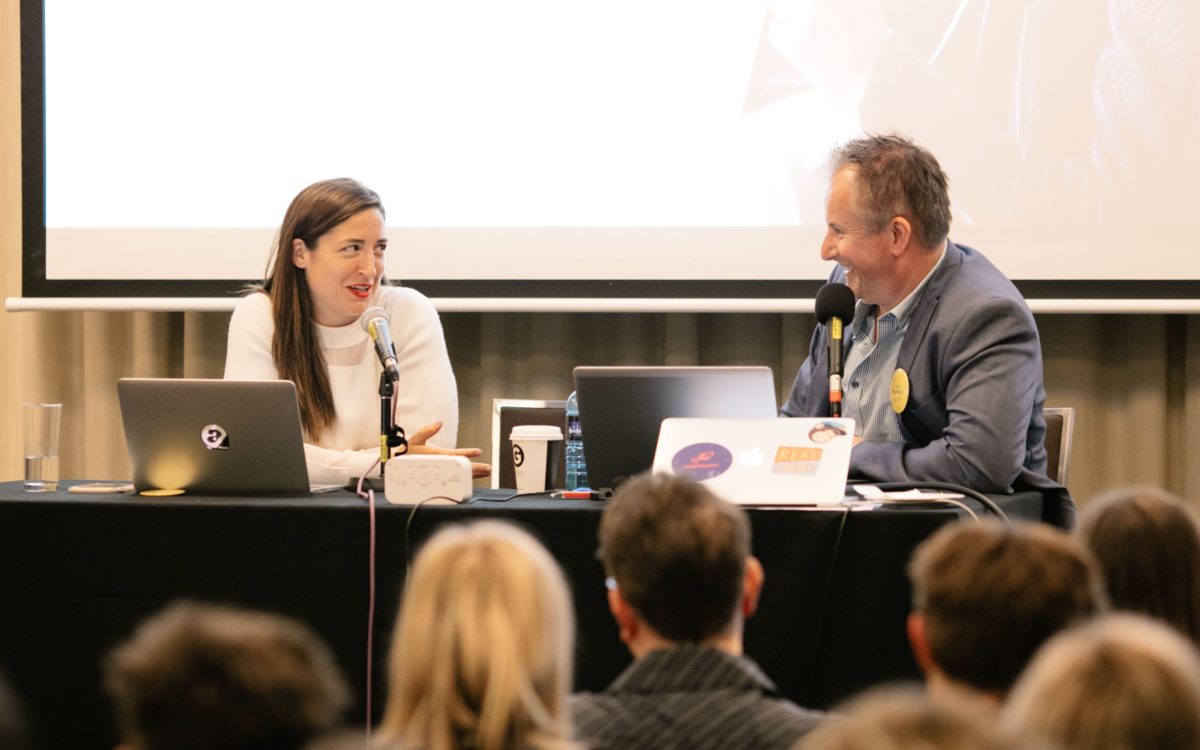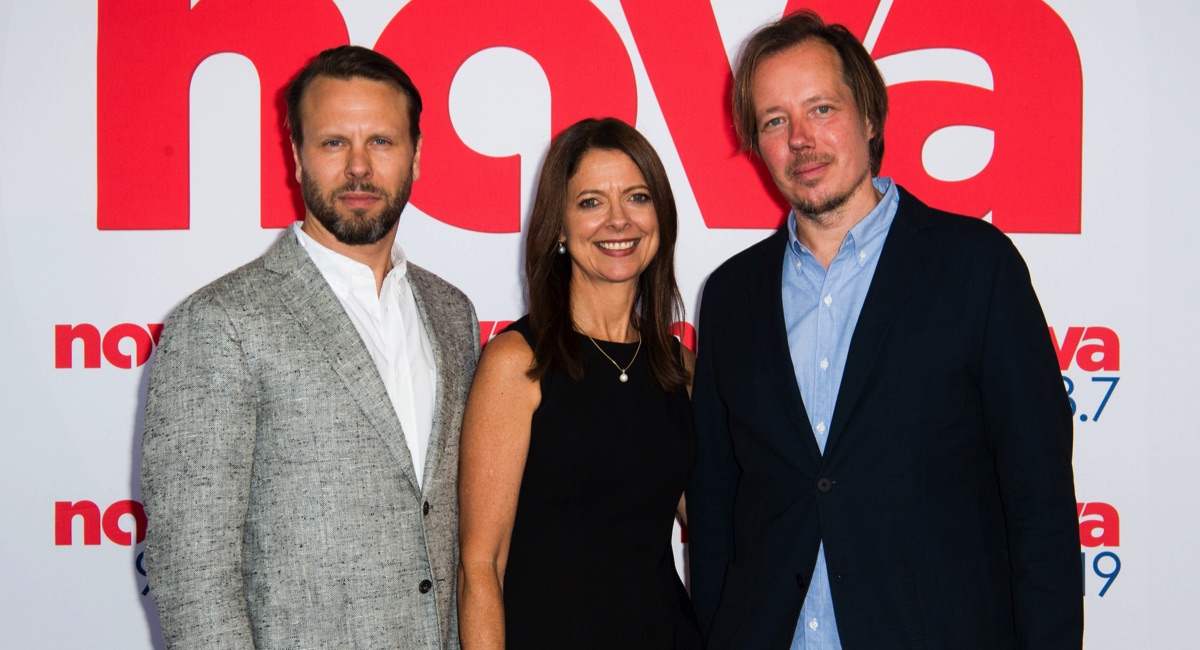Australia is about to experience a massive boom in podcasting in the next 6-12 months, according to Caitlin Thompson, the content director at Swedish company Acast, a curated platform for podcasts.
Thompson was in Australia along with Acast’s co-founder Karl Rosander for the 2017 Audiocraft conference. Mediaweek caught up with the duo on a rainy Friday morning at the Four Seasons hotel in Sydney. “This is summer in Stockholm. It’s nice,” Rosander told Mediaweek. “This is like New York too,” Thompson added, talking about where she is based. While Sydney wasn’t putting on its best show for the visitors, the duo agreed that they felt right at home.
Launched in 2014 by Rosander and Mans Ulvestam, the podcast platform currently controls the biggest share of the advertising market in the space in Sweden and UK and has a major presence in the US as well. The company broke into the Australian market earlier this year via its partnership with Nova Entertainment.
“When podcast was booming in Stockholm in 2012, I was looking into the why, when and how come. There was no data to understand this,” Rosander told Mediaweek. “All parts of the podcast ecosystem were broken at the time. You had to have many different services to publish one podcast. If you were about to sell your podcast to an advertiser, you had to have a sales company that connected you with a sponsor and you had to hard-code that ad into your sound file.”
Rosander boasts that Acast can serve every need of a podcaster and an advertiser. The company can host podcasts and also place ads into them, depending on an advertiser’s requirements and brief, via programmatic ad buys.
“Now we can say, ‘Hey, you want a tonne of audience between 27 and 32 who like sports, are young women and are curious thinkers? Here’s how to get them. Maybe 20 of them will come from this show, another 400 from this other show and another million from this other show.’ The whole idea is that we can package them together,” Thompson explained.
Rosander added: “We sell reach.
“It’s similar to how Google and YouTube sell.”
The duo defined Acast as the “YouTube for podcasts”. While the platform seems like a dream for any podcaster looking to gain more listeners and make money from their work, unlike YouTube, Acast is not publicly open for anyone and everyone to join. It works on an invite-only system. However, opening up the platform to the wider community of podcasters is something that Rosander and his team at Acast have considered for some time. “It is something that we are flirting with,” Thompson. “I don’t mean to sound arrogant, but one of the exciting things about working for Acast is knowing that’s in our future. The second we decide to open it, it could turn into a YouTube-size endeavour.”

Caitlin Thompson with Nova’s Jay Walkerden
Acast divides content into three categories: the independents, diversified media companies and radio.
“The first one is independent podcasts, people who create something that is rough around the edges or more polished but it is a side business for the creators,” Thompson said.
“Another model is a media company that has a tonne of assets like a digital footprint, a video footprint and then it has an audio footprint. For example, that would the Financial Times, The Economist or The Huffington Post. In a lot of cases they are not making shows that are as big as the independents but they tend to have more leverage and ways to get audiences to consume them.
“Then the third kind is like radio. That’s then broken down into public and commercial radio.”
Prior to penning the deal with Nova Entertainment in Australia, Acast had conversations with almost all the major broadcasters in the country including Nine.
“What appealed to us about Nova particularly is they are really being smart about how they repurpose terrestrial content. They are not just putting up broadcasts. They are re-editing, remixing and they are making it more of an on-demand experience,” Thompson said.
The recent competition hosted by the radio broadcaster Podquest signalled to Acast that it is committed to unearthing new talent. Unlike Acast’s partnerships in other markets around the world, Nova has its own sales team working on its podcast products.
“This is very interesting for us,” Rosander said. “It shows how scalable Acast is. But we will have our sales people working on them as well.”
Following the partnership with Nova Entertainment, Acast is looking to expand its footprint in Australia.
Rosander and Thompson revealed they would be hiring sales and content people in the market in the next 6-12 months.
How can Acast help increase a podcast’s reach?
“Look at the podcast that started from scratch. It’s called My Dad Wrote A Porno. It’s one of the biggest podcasts in the world at the moment,” Rosander said. “They will be at the Sydney Opera House later in the year doing a show.”
Jamie Morton, James Cooper and Alice Levine host the weekly show. In each episode, Morton reads a new chapter from a series of erotic novels titled “Belinda Blinked”, written by his father under the name Rocky Flintstone.
“The novel is really bad,” Thompson and Rosander said in unison. [Laughs] “The show started from nothing. [It has gained popularity] through a combination of working with our chief content officer, who is based in London, and cross promoting on other shows.”
Acast differs from how cross promotion is normally done where a talent from one show goes onto another and talks about their own show. “We can do that at scale,” Thompson said. “We can say, ‘Hey, My Dad Wrote A Porno has tons of audience in London, but they have no audience in the States, so how can we cross promote their show without arranging for them to be on every single one of the US shows?’ We would ask them to make a trailer, advertising their newest season. We would put that trailer on every single show in the American market and target it towards whomever we want to – for example people aged 25-35 who are interested in comedy. All of sudden we can give that show scale. That’s called dynamic cross promotion.”
Scouting for next big podcaster
Acast isn’t a publicly open platform for all to use. Podcasters can only use the service once they have been invited to do so by the company.
This makes Thompson’s job very important. “My job is to scout for talent,” she explained. “I am basically like a talent scout for a record label saying, ‘This indie band is really good. Let’s get them now, so when they blow up in six months we can build an entire campaign around them.’
“My job is to essentially work with a lot of bigger players in the space, but also keep a pipeline of exciting new content.”
Acast hasn’t signed any independent podcasters in Australia yet, but Thompson smiled when asked if she had any in mind. She said she can reveal nothing until the talent has been signed. Watch this space for more!
Acast+
This is the company’s premium service, which uses an ad-free paywall strategy. This means that users pay to listen to podcasts and are not served any ads in between.
“We’ve done a test of it with 15 podcasts,” Rosander said. “It works better with certain content than others.”
One that has worked well is a football fan podcast called The Football Ramble.
“They make a monthly special which tends to do really well,” Rosander claimed.
Photo: Acast co-founder Karl Rosander, Nova Entertainment’s CEO Cathy O’Connor, Acast CEO and Co-Founder Mans Ulvestam
